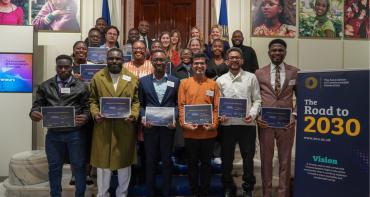First Commonwealth conference on training of youth workers will chart a way forward for professionalising the sector

South African President Jacob Zuma yesterday opened the first Commonwealth Conference on the Education and Training of Youth Workers, by calling for greater recognition of the “crucial” role played by the frontline providers of services to young people.
The three-day meeting taking place in Pretoria, South Africa, will focus on professionalising youth work, to ensure practitioners are recognised for the part they play in developing young people’s potential.
“We are all present here today because young people hold the key to our future. We can only prosper if there are dedicated efforts to invest in the youth,” Mr Zuma said.
He noted that while training has taken place for many youth workers, the sector is still not recognised as a profession. The South African President said the conference will go a long way towards raising awareness so that practitioners can be recognised accordingly.
“This conference enables an opportunity to support young people in their pursuits, and in particular, to appreciate the efforts of youth workers as they are the frontline providers of services to the youth, be it healthcare, education or developmental work.”
In his speech, Mr Zuma applauded the Commonwealth for its investment in youth and education, given that more than 50 per cent of the Commonwealth’s population is under the age of 30. “The future of the Commonwealth is tied inexorably to the future of young people,” he said.
Delegates at the biennial conference will chart a way forward for creating standards and professional networks to enhance the practice of youth work.
In her speech to delegates, Commonwealth Deputy Secretary-General Mmasekgoa Masire-Mwamba said: “In many Commonwealth countries youth work is still an emerging discipline and profession that needs to take greater root in the national development strategy. Investing in the development of professional youth workers will bring together, at local and national levels, the persons with the right skills and approaches to engage and support young people who still remain as an untapped potential in many respects.”
Key issues on the conference agenda include creating a map of current programmes for educating and training youth workers, sharing national experiences of professionalising and creating awareness of youth work, current qualifications and research on the sector, and a Commonwealth framework on moving towards standardisation of youth work.
Delegates will also explore the promotion of youth work through national youth policies and programmes and the formation of youth worker professional associations and a Commonwealth Youth Workers’ Association.
Mr Zuma said the conference follows many years of advocacy by the Commonwealth for the professionalisation of the youth work sector.
In 1973, Commonwealth leaders created a dedicated Commonwealth Youth Programme (CYP) to train government staff and other interested persons with the skills and knowledge to lead youth empowerment work in their member countries.
Over the subsequent 40 years, CYP has partnered with member governments and academic institutions to provide education and training for youth workers through programmes such as the Diploma in Youth Development Work – delivered by more than 30 higher learning institutions - and short courses. With the Commonwealth’s support, the University of the West Indies in the Caribbean recently launched a new Bachelor’s Degree in Youth Development Work, with over 150 students from 16 countries now enrolled. The Commonwealth is examining how to replicate the degree in other countries and institutions.
The 2013 conference is hosted by the Government of South Africa in partnership with CYP, the National Youth Development Agency and the University of South Africa.
The outcomes from the conference will feed into the 8th Commonwealth Youth Ministers Meeting in Papua New Guinea from 15 to 19 April 2013.



